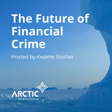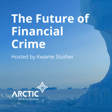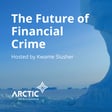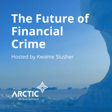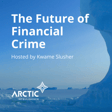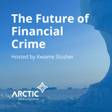Become a Creator today!Start creating today - Share your story with the world!
Start for free
00:00:00
00:00:01

The Future of Financial Crime In South Africa
Join The Future of Financial Crime Podcast as we delve into South Africa’s financial crime regulatory landscape with Roy Melnick, Managing Director of Financial Crime Risk Management Consultants. Roy examines what has changed, what hasn’t, and what still needs to change to protect South Africa’s financial system.
The Future of Financial Crime Podcast is a production of Arctic Intelligence, an award-winning Regulatory Technology (RegTech) company that transforms financial crime risk assessments to help protect your business.
Recommended
Transcript
Introduction to the Podcast
00:00:00
Speaker
This is the Future of Financial Crime, a production of Arctic Intelligence, a podcast takes a global perspective on financial crime compliance. And I firmly believe that you don't know what you don't know. And then, you know, this is absolutely critical to understand your operating environment is to conduct ongoing risk assessments.
Meet Roy Melnick
00:00:26
Speaker
Welcome to the Future of Financial Crime We have with us Roy Melnick, Managing Director for Financial Crime Risk Management Consultants from South Africa. Welcome to the podcast. Thank you Kwame. It's good being here. So we can jump straight into it. You know, tell me a bit about yourself.
00:00:43
Speaker
Right, currently call me, ah suppose I suppose I'm in the twilight of a very long career in financial crime, ah risk and compliance management, that is. I'm currently the managing director, as you said, of of a a niche type of a consulting house that focuses on financial crime risk management and compliance, which is quite clearly where we get our name from.
00:01:09
Speaker
um ah So it's yeah in in terms of my career, it's been a long one. It's one always in terms of combat combating your financial crime, whether with government initially, in the private sector with a large banking group, and and now in our own consulting firm. With all that and that experience that you have, what's keeping you awake at night when it comes to financial crime?
South Africa's Unique Financial Crime Challenges
00:01:36
Speaker
but I think we're in a unique situation in South Africa. komi We've come through a very challenging time in ah in our history with regards to probably commonly known as state capture.
00:01:50
Speaker
and we are going through the process of managing that. And and I suppose in in terms of what's keeping me awake at night, I suppose I have a passion to ensure that the country is successful and and and is able to, I suppose, fight financial crime with all that it has. And it's it's bringing the the various parts of society together. That's one of my... sort of focus areas for now is how we bring civil society, the the public sector and the private sector together in public-private partnership to manage the time in our country's history.
00:02:29
Speaker
Speaking about travel history, it it's good to maybe take a bit of a step back for those listeners who might not be familiar with, you know, the the framework and ecosystem within South Africa. So, you know, tell me a bit about the regulatory ecosystem as it relates to financial crime regulation.
Regulatory Influences and National Risk Assessment
00:02:44
Speaker
So I would imagine, as in in the case of most countries, we do get our direction, of course, from the Financial Action Task Force in terms of managing your financial crime and, ah you know, ah being a ah member country and of the Financial Action Task Force and the only representative for Africa. I suppose its it's a big focus area for and know this country. Similarly to most countries, we have written our own legislation.
00:03:15
Speaker
so laws, regulations and subservient ah pieces of of legislation, I would imagine, to meet, to ensure that we also move towards meeting the fattive recommendations as ah as a country. So yes, we have just recently issued our national risk assessment as as a country and certainly at the country level in terms of government agencies the you know the sectoral responses and you know to national risk assessment and then and and institutional responses ah you know that's where we are right now. ah Institutions have for a number of years already had a look at how they can safeguard
00:03:58
Speaker
themselves and their employees through applying, I suppose, what we would imagine as risk management principles in terms of managing the ecosystem around you as an institution. And pretty much where we are, our focus, of course, is now ah South Africa was a few months back, ah placed on the greatest by the Financial Election Task Force.
00:04:20
Speaker
So I suppose all people fast focusing on how best today you do we get ourselves off the grey list and you know so that it doesn't affect our economy. Yeah, sure. You know, you've had all this experience, all these years of experience, and you talked a bit about the ecosystem as it exists. and How have you seen, I guess, both the financial crime risks as they pose themselves evolve in your time in the industry? And I guess what has been the response from the regulators?
Transitioning to a Risk-Based Approach
00:04:53
Speaker
Well, I suppose the world has evolved you know from the early days when you know the the first fat of 40 recommendations and the 12 special recommendations in terms of of managing terrorist activity ah moved from more of a rules-based approach you know to a risk-based approach. And I think that's sensible, right from a global perspective in terms of managing a global financial system.
00:05:16
Speaker
to country level, where we need to safeguard the operating environment and the financial system within the country itself. It makes absolute sense to me to apply a risk-based approach. When we start looking at institutions that are regulated and required you know to implement their own control measures, it makes sense that the institution understands its risk and is able to put appropriate control measures in place, rather than being told by a regulator, how they should be running their business. It just doesn't make sense you know doing it that way. So to move from a rules-based approach to more of a risk-based approach and holding the institutions accountable for the way that they do business makes absolute sense.
00:06:01
Speaker
and Yeah absolutely and I guess one of the challenges you might face with risk-based approach as as good as all the things you've mentioned there is maybe when it comes time for reporting to um the and reporting requirements you might get not an equal type of reporting across the board from institutions like in terms of that relationship between regulator and regulated entities is there enough communication so the institutions understand what is expected of them? Short answer is probably no.
00:06:28
Speaker
and I would imagine that there needs to be increasing dialogue between regulators and regulated. In terms of the regulators understanding the institutional operating environment a little bit better, it's not that they don't, but I suppose the only way we're going to understand each other's worlds is by speaking to each other and it's creating those opportunities for dialogue.
00:06:52
Speaker
And then similarly, from an institutional perspective or a sectoral perspective, it is to understand the the role of government. It's to understand that the way that they operate, the eu regulators, the court systems, I suppose yeah the law enforcement and and this idiosyncrasies around law enforcement, around customs and excise and how how they all operate you know as as a system and the country system.
00:07:21
Speaker
to manage and and combat financial crime. And I think we can do better as a private institutions in understanding that side of things. So it's I suppose it's it's it's all about us speaking to each other and when encountering challenges, to voice those challenges and manage them alongside the regulator rather than on our own.
00:07:43
Speaker
So I feel ah I've been picking on you to to find the negative aspect of things and how it's been going in terms of the lay of the land. But like I guess what have you seen go right um in terms of just institutional responsibility, so what the regulators have been putting out there as well?
00:08:01
Speaker
You know, it's it's a difficult one and to say, ah to put your finger on exactly that you know what is going right, because it's been a long journey. it's been if The law has been on our but ah law books from 2001, we're 20 some years later. So some organisations fared fairly well. I suppose the focus has been on banks and financial institutions. So they've they've evolved over time and and they Controlling environment is matured. They're able to manage their risks better around them. Are they doing it 100% correctly? Well, I suppose our fat of gray listing will probably say, you know, there's a little bit from all stakeholders in the ecosystem, you know, to to do a bit better. But what has gone well is there has been a maturity around that. As I said, there has been a real
00:08:57
Speaker
change in in in moving from a rules-based to a risk-based environment. So things have gone well and I think institutions understand it a lot better. But I think i think there is room for improvement and and clearly you know that's what fatter feels as well.
00:09:14
Speaker
And I suppose what makes it a bit difficult, and the reason I'm going around in the circles as well, is we just recently had a whole number of new regulated institutions added. And they clearly have not had the 20-some years to to mature the operating environment, so they almost need to start from the beginning.
00:09:36
Speaker
and understand you know the current environment and putting control measures. So there's going to be a little bit of a lag time around that in terms of the understanding of not only what is required in terms of laws and regulation, but also understand their own operating environment and what controls they need to put in place. so So yes, there's been good and better understanding, but there is room for more improvement.
Promoting Public-Private Partnerships
00:10:01
Speaker
I don't want to use the word advice in the legal sense of the word, just what tips, you know, what, what a bit of wisdom do you have for financial crime professionals in this space? What may be some recommendations you have for helping them get this piece right in the organizations or helping organizations know what to look for in a financial crime professional.
00:10:20
Speaker
Well, I think ah one of the things that's obvious, and we have been participating in some workshops around creating public and private partnerships and and and seeing how best to do that. And we feel that we are just in a, we're in a position where we can use our many years of experience in terms of of getting that sorted. But certainly I think it's, I almost sense that over the last 20 or so years, there's been the regulator up here and the regulator down here.
00:10:51
Speaker
And and you know the that the opportunities to actually work this out together and manage the risk in the organization, in the sector, in the country, is that we need to create they need to create opportunities, whether you regulate it or whether you're the regulator. It's create those opportunities to have dialogue and so and speak to each other about you know areas that are concerning. it's almost being separated, you know, as from we're regulators, you're regulated. You know, we tell you what to do, you do what is required. But that that that understanding of each other's operating environments is critical to the success of managing financial crime.
00:11:32
Speaker
What are your recommendations around you know organizations who are thinking about what kinds of tools? yeah So Kwame, I think you raised a very important question over there. And I firmly believe that you don't know what you don't know. And and you know this is absolutely critical to understand your operating environment is to conduct ongoing risk assessments.
Importance of Ongoing Risk Assessments
00:11:57
Speaker
And I think this is where both from an Arctic perspective and our perspective,
00:12:02
Speaker
The risk assessment platform allows you to operate efficiently, understanding what your risks are, whether they're external to your organization or internal to your organization. And without conducting a risk assessment, I think you're actually failing to a certain extent.
00:12:20
Speaker
in properly understanding the financial crime impact on your organisation. And this is done through i ah suppose a process, an internal process within your organisation in terms of understanding the risks that surround you.
00:12:35
Speaker
the emerging risk, the current risks, how yeah how these are managed on an ongoing basis. And through conducting risk assessment, it allows you to make the changes that are required to make sure that you whatever you've implemented is effective and suitable for your organization. And this needs to be done initially Through risk assessment, funnily enough, you know, the the first question that a regulator does ask when you come into when they come in and conduct an inspection is provide us with a copy of your risk assessment, because that would give them an indication in terms of how well you are managing your organism. Is there a requirement in the South African context for an annual compliance report and does that play a role in potential action in the end?
Annual Compliance Reporting Requirements
00:13:20
Speaker
Yes.
00:13:22
Speaker
So the the Financial Intelligence Centre, which is our FIU in South Africa, has issued a directive requiring that organisations do submit an annual report in terms of the control environment and the the management of financial crime, risk and compliance, of course. So there is that. But in terms of what I do know, having worked across many countries in Africa, is there are a number of countries, and family are not in New Zealand as well,
00:13:52
Speaker
where the the conducting of an annual financial crime risk assessment is required as a regulatory requirement. and so Which is a little bit different to you just displaying a report in terms of what you've done and where you've done. I suppose through conducting a proper risk assessment it's going to give an indication how well your risks are managed.
00:14:13
Speaker
Well thank you so much for your time Roy, today. Thank you very much for coming, it's been great to meet you. This has been a production of Arctic Intamations. And the music is a production by Royalty Free Music.
